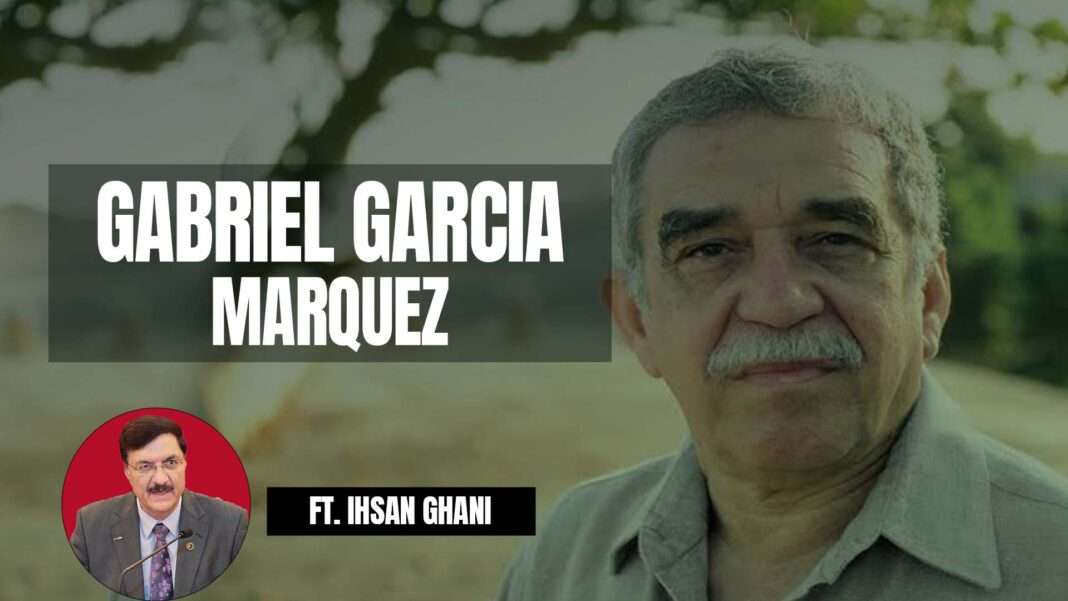Shortly after the Second World War, a young man from Aracataca got on stage in Zipaquirá and delivered an improvised speech. One of his phrases stuck in the minds of the people listening, “Franklin Delano Roosevelt,” he said, who had died that same year, “who, like El Cid, knows how to win battles after death.”
The people loved the way he had put it, and the simple yet memorable phrase began to appear on street posters and even on portraits of Roosevelt in the windows of stores. “And so my first public success was not as a poet or novelist,” he wrote in his autobiography, “but as an orator, and what is even worse, as a political orator.”
Like most artists, after repeated setbacks, he turned his back on literature and believed his future was in scriptwriting. “Cinema is much more noble and reproductive than literature,” he explained to a friend in 1965. “Imagine that I am now receiving ten thousand pesos for reviewing a script. And to think that I have wasted so much time of my life writing short stories and reportage. Besides, everything in literature seems to be already written. Literature is great to enjoy as a reader… not as a writer.”
When Gabriel Garcia Marquez sat down to write One Hundred Years of Solitude in fall 1965, his emotional state was identical to his feelings while he was writing his first book Leaf Storm. He described himself this way then: “I see him perfectly: he is a thirty-eight year old man who believes that he will not write anything else in his life, that this is his last chance, and who tries to put everything – everything he remembers and everything he has learned from all the authors he has read.”
García Márquez was, indeed, doubtful about committing to writing One Hundred Years of Solitude. His doubts had grown into a dreadful writer’s block. Critic Emir Rodríguez saw it first-hand: “When I met Gabo in Mexico in 1964, I saw a man who lived in hell for not being able to write the great novel that he has thought out and written mentally even in its smallest details.”
But five triggering events during the summer and fall of 1965 brought Gabriel Garcia Marquez back to the writing of One Hundred Years of Solitude, a book that has been translated into 46 languages and has sold over 50 million copies.
First, in July, the critic Luis Harss interviewed him for a book of conversations with ten major Latin American writers.
Second, in July, Gabriel Garcia Marquez signed a comprehensive contract with literary agent Carmen Balcells, who, aware of the international boom in Latin American literature, had travelled across the Americas to recruit as many clients as possible for her agency.
Third, at the end of August, Gabriel Garcia Marquez attended a momentous talk by his mentor Carlos Fuentes (“You start by writing to live. You end by writing so as not to die.”) on how to become a bestselling, cosmopolitan writer.
Fourth, between August and October, international media outlets such as Life en Español, The Times Literary Supplement, and Papel Literario published articles on new and old Latin American writers, including García Márquez.
And fifth, for the first time in his life he signed contracts with major international commercial presses to publish all his previous and future work in Spanish and English.
During the summer of 1965, while driving from Mexico City to Acapulco for a vacation with his wife and two children, a cow crossed the road in front of his car. He stopped abruptly. Right there on the road, in a stroke of brilliant insight, the writer came up with the first sentence of a novel that would change world literature: “Many years later, as he faced the firing squad, Colonel Aureliano Buendía was to remember that distant afternoon when his father took him to discover ice.”
Now there was not a second to lose. The writer turned his car around and rushed back home to Mexico City. Eighteen months later, he emerged from his studio with a completed manuscript. A book about which journalist William Kennedy wrote, “the first piece of literature since the book of Genesis that should be the required reading for the entire human race.”
Márquez came into my life rather late, like under two decades back but it was love at first sight. For that I thank my son Babur Ghani. Since then, we have stayed together, if not through books, then through quotes or through the characters that roam all around us, every day every moment. More importantly through life, that he infuses with death. Like Love In The Times Of Cholera, like Chronicles Of A Death Foretold, like One Hundred Years Of Solitude.
Gabrielle Bellot Writes, “For the Colombian author, death and time were intimately linked; to die, after all, is to have one’s time stop. Death happens in time, but is also timeless and timelessness, something exemplified by García Márquez’s frequent equation of a lack of motion—being frozen in time—with being dead. This perhaps appears most clearly in an early short story, “The Sea of Lost Time,” wherein two men dive to the bottom of a sea that a village throws corpses into—“the sea of the dead”—and find it contains frozen fragments of the past, as well as countless corpses and roses: a beautiful bizarre space, lost to most clocks, where death blooms.
We all get inspired by visual images, so did Gabo but then he put these inspirations into writings. So, it comes as no surprise that he had a long and involved history with film. He was a script writer, film critic, director. He founded and served as executive director of the Film Institute in Havana, was the head of the Latin American Film Foundation, and wrote several screenplays.
British director Mike Newell filmed Love In The Times Of Cholera in Cartagena, Colombia.
His novel Of Love and Other Demons was adapted. The same novel was adapted by Hungarian composer Peter Eotvos to form the opera Love and Other Demons. Starting with the Blue Lobster in 1954, which he wrote and directed, Marquez wrote 25 scripts.
I have read and read and read and have wanted and wanted and wanted to write but only like Marquez and if only I could see magic in the ordinary. If I was to learn one and only one language, it would be Spanish and Russian and German so I could read Marquez and Dostoevsky and Nietzsche in the language they wrote in
Did-you-knows about Marquez:
- He was inspired to write by an incorrect translation of Kafka’s “The Metamorphosis-wrong version”
- He had a strong interest in politics, and was a committed socialist, probably influenced by his grandfather (“the Colonel”). Marquez had a strongly leftist, anti-imperialist worldview, which makes itself apparent in his political writings. He vocally opposed opposed a number of Latin American dictatorships, and was even present in Caracas for the 1958 coup d’etat that ousted Venezuelan dictator Marcos Perez Jimenez.
- As a result, he was labeled a subversive in the United States. Marquez’s political views, especially his criticisms of what he viewed as American imperialism, earned him the ire of the US Government. He was systematically denied visas until Bill Clinton became the President and lifted the ban, because One Hundred Years of Solitude was one of his favorite books.
- He never let anyone adapt One Hundred Years of Solitude into a film, because, in his words, “(t)hey would cast someone like Robert Redford and most of us do not have relatives who look like Robert Redford.” Charles Bronson would probably have been acceptable to Gabo.
- He was close to his grandfather, a retired army man who inspired the novel “No One Writes to the Colonel.”
“With the passing of Gabriel Garcia Marquez, the world has lost one of its greatest visionary writers — and one of my favorites from the time I was young”, President Barack Obama
The Author is a Former IB Chief, IG KP and National Coordinator NACTA.







